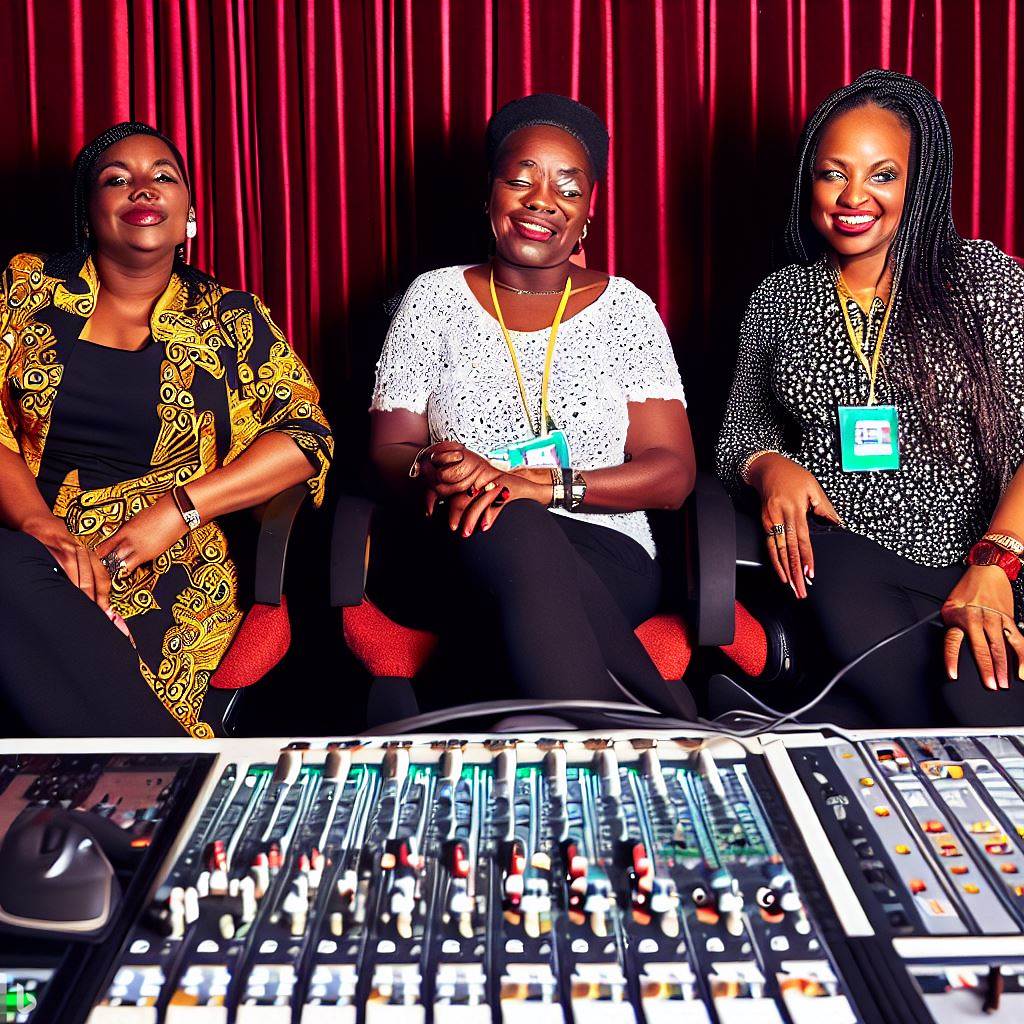Introduction
Talent development is crucial for Nigeria’s growth and success in various fields.
Local circus companies play a significant role in shaping Nigeria’s talent and fostering creativity.
Talent development holds immense importance for the growth and success of Nigeria.
By identifying and nurturing individuals’ skills and abilities, the country can capitalize on its human resources to drive economic development in various sectors.
Nigeria boasts a rich pool of talented individuals, and it is essential to provide them with the necessary support and platforms to flourish.
Local circus companies have emerged as unique and innovative avenues for talent development in Nigeria.
These companies focus on honing various artistic abilities, such as acrobatics, juggling, and clowning, while also promoting discipline, teamwork, and physical fitness.
Through their programs and performances, they inspire young Nigerians to explore their artistic talents and challenge their creative boundaries.
These circus companies provide a nurturing environment for individuals to develop their skills.
They offer training workshops, mentorship programs, and performance opportunities, enabling aspiring artists to refine their craft and gain exposure.
The inclusive nature of these companies allows people from diverse backgrounds to come together, fostering cultural exchange and unity.
Furthermore, local circus companies have played a pivotal role in shaping Nigeria’s talent.
By showcasing their skills at national and international platforms, these companies not only promote the rich artistic heritage of Nigeria but also challenge the global perception of African talent.
Background on Nigeria’s talent industry
The cultural importance of talent in Nigeria
Talent has always played a significant role in Nigerian culture, with a rich history of showcasing diverse skills and abilities.
From traditional music and dance to storytelling and acrobatics, talent has been deeply ingrained in the fabric of Nigerian society.
In Nigeria, talent is not just seen as a form of entertainment, but also as a means of cultural preservation and identity.
It is a way for people to express themselves and their heritage, keeping traditions alive through generations.
In many Nigerian communities, talent is celebrated and revered, with talented individuals being seen as valuable members of society.
From a young age, children are encouraged to showcase their skills and talents, whether it be in singing, dancing, or playing musical instruments.
There are numerous talent competitions and shows that provide platforms for individuals to showcase their abilities and gain recognition.
These competitions have become a significant part of Nigerian popular culture, attracting millions of viewers and fans.
Mention the growth of different talent sectors in the country
Over the years, Nigeria’s talent industry has witnessed substantial growth, with various sectors emerging and evolving.
One of the most prominent sectors is the music industry, which has produced globally recognized artists such as Fela Kuti, Wizkid, and Burna Boy.
Nigerian music, with its unique blend of afrobeat and contemporary sounds, has gained international acclaim and influenced music scenes globally.
Another significant talent sector in Nigeria is Nollywood, the country’s booming film industry. Nollywood is known for its prolific output, producing numerous movies each year.
Nigerian actors, actresses, and filmmakers have received recognition and awards on the global stage, contributing to the country’s cultural and economic development.
In recent years, the comedy industry has also experienced tremendous growth, with Nigerian comedians gaining popularity both nationally and internationally.
Stand-up comedy shows, comedy skits, and online platforms have provided opportunities for comedians to showcase their talent and connect with audiences.
Dance is another talent sector that has flourished in Nigeria, with various dance crews and groups gaining recognition through participation in talent shows and competitions.
Nigerian dances, such as the Azonto and Shaku Shaku, have become popular across the continent and globally, with dance styles influencing music videos and performances.
Furthermore, Nigeria has seen a rise in visual arts and fashion talents.
Young Nigerian designers and artists are creating innovative and unique works, showcasing their talents at international fashion shows and art exhibitions.
Explanation of circus arts
Concept of circus arts and its various forms
Circus arts refer to a variety of performances involving acrobatics, daredevil acts, clowning, and other skills showcased in a circus setting.
This form of entertainment combines athleticism, creativity, and showmanship to captivate audiences.
There are several types of circus arts, including aerial performances, where artists perform acrobatic moves on suspended equipment such as trapeze or aerial silk.
Ground-based acts, such as tightrope walking, juggling, and stilt-walking, also come under the umbrella of circus arts.
Historical significance of circus arts in Nigeria
In Nigeria, circus arts have a rich and fascinating history that has helped shape the country’s talent and cultural landscape.
They have played a crucial role in showcasing the diverse skills and abilities of Nigerian performers.
Historically, circus arts in Nigeria can be traced back to the traveling circuses that roamed the country during the colonial era.
These circuses, mainly run by Europeans, introduced Nigerians to the thrilling world of acrobatics, clowning, and other circus acts.
Over time, Nigerian performers began developing their unique style and incorporating traditional elements into their circus performances.
This fusion of traditional and modern circus arts has given birth to a distinct Nigerian circus culture that celebrates the country’s rich heritage.
The historical significance of circus arts in Nigeria goes beyond entertainment.
It has provided a platform for talented individuals from different backgrounds to showcase their skills and earn a living.
Many young Nigerians have found a career path in circus arts, enabling them to uplift themselves and their communities.
Furthermore, circus companies in Nigeria have become catalysts for social change.
They often provide training programs and workshops to empower young people and offer opportunities for personal growth and development.
Circus arts have been instrumental in instilling discipline, teamwork, and self-confidence in aspiring artists.
Read: Unveiling the Hidden Challenges of Circus Life in Nigeria
Role of local circus companies in talent development
How local circus companies provide a platform for Nigerian talent
- Local circus companies offer a stage for Nigerian performers to showcase their skills and abilities.
- They provide training programs and workshops to nurture and develop the talent of aspiring artists.
- By creating performance opportunities, local circus companies allow Nigerian talent to gain experience and exposure.
- These companies give artists a chance to collaborate with other skilled performers, fostering creativity and innovation.
- Through auditions and competitions, local circus companies identify and promote exceptional Nigerian talent.
Contribution of local circus companies to the overall growth of the talent industry
- Local circus companies enhance the diversity and richness of the talent industry in Nigeria.
- With their unique acts and performances, they bring cultural authenticity to the talent industry.
- Local circus companies contribute to the professionalization of the talent industry by setting high standards.
- They inspire and motivate aspiring artists by providing success stories and role models.
- Through collaborations and partnerships, local circus companies expand the reach and impact of the talent industry.
- They contribute to the economic growth of Nigeria by creating job opportunities for artists and support staff.
Through their platforms and contributions, local circus companies play a vital role in shaping Nigeria’s talent landscape.
They provide opportunities, support, and resources for Nigerian artists to flourish and succeed, while also adding value to the overall growth and development of the talent industry.
It is important to recognise and celebrate the invaluable role that local circus companies play in nurturing and promoting Nigerian talent.
Read: The Joy and Perseverance of Nigerian Circus Performers

Success stories of Nigerian talents shaped by circus companies
Examples of successful Nigerian talents who started with local circus companies
There are numerous Nigerian talents who have found success through their association with local circus companies.
These individuals started their journeys in the circus and went on to achieve great things in their respective fields.
- Segun Adefemi: Segun Adefemi, a talented acrobat, began his career at a local circus company in Lagos.
He honed his skills in acrobatics and soon became a renowned performer.
Adefemi later went on to create his own acrobatic troupe that has gained international recognition. - Funke Adekunle: Funke Adekunle, a talented contortionist, discovered her passion for contortionism at a circus company in Abuja.
She underwent rigorous training and developed her unique style.
Today, Adekunle performs at prestigious events around the world and is considered one of the best contortionists in the industry. - Chinedu Okafor: Chinedu Okafor, a gifted juggler, found his calling at a local circus company in Enugu.
He started with basic juggling techniques and gradually mastered complex routines.
Okafor now tours internationally, mesmerizing audiences with his exceptional juggling skills.
Achievements and how circus companies helped shape their careers
These successful Nigerian talents owe a great deal to the local circus companies that nurtured their skills and provided them with a platform to showcase their talents.
The circus companies played a pivotal role in shaping their careers and enabling them to achieve remarkable feats.
- Skill enhancement: The circus companies provided these talents with the opportunity to enhance their skills.
Through rigorous training and regular performances, the performers were able to refine their craft and reach new levels of expertise.
The companies offered workshops, specialized training sessions, and exposure to experienced coaches that helped the talents grow and improve. - Performance opportunities: Local circus companies gave these talents invaluable performance opportunities.
They provided platforms for the talents to showcase their skills and gain exposure in front of large audiences.
These performances not only helped the talents gain confidence but also attracted the attention of talent scouts and industry professionals. - Networking and connections: Being associated with a circus company allowed these talents to make valuable connections within the industry.
They had the opportunity to interact with established performers, directors, and producers, opening doors for collaborations and future opportunities.
The network of contacts provided by the circus companies proved instrumental in helping these talents secure gigs and further their careers. - International exposure: The success stories of these Nigerian talents would not have been possible without the international exposure provided by the circus companies.
Many circus companies organize tours and participate in international circus events.
Through collaboration with these companies, circus artists have achieved remarkable feats, garnered international recognition, and contributed to the enduring appeal of circus arts.
Read: Behind the Scenes: A Day in the Life of a Nigerian Circus Performer
Challenges faced by local circus companies in Nigeria
Lack of government support and funding for circus arts
- Nigeria’s local circus companies often struggle due to the lack of government support.
- Without proper funding, these companies find it challenging to sustain their operations and growth.
- Government agencies and institutions should recognize the importance of circus arts and provide financial assistance.
- Investing in local circus companies can promote Nigerian culture and provide employment opportunities for talented individuals.
- By supporting these companies, the government can also contribute to the country’s entertainment industry development.
Difficulties in attracting audiences and sponsors
- One of the significant challenges faced by local circus companies in Nigeria is attracting audiences to their shows.
- The popularity of other forms of entertainment often outshines the circus, making it difficult to compete for attention.
- A lack of awareness about circus arts and their potential further compounds the problem.
- Local circus companies must invest in effective marketing strategies to overcome these difficulties.
- Conveying the uniqueness and excitement of their performances can help attract more audiences.
- Additionally, local circus companies need sponsors to support their endeavors and cultural preservation.
- However, attracting sponsors can be challenging due to the limited exposure and understanding of circus arts in Nigeria.
Local circus companies in Nigeria face significant challenges due to the lack of government support and funding, as well as difficulties in attracting audiences and sponsors.
The government should recognize the value of circus arts and provide financial assistance to these companies.
By investing in local circus companies, Nigeria can promote its culture, create employment opportunities, and contribute to the development of its entertainment industry.
Additionally, local circus companies must work on effectively marketing their shows to attract audiences and seek collaborations with sponsors to enhance their growth and sustainability.
Overcoming these challenges will enable local circus companies in Nigeria to thrive and shape the country’s talent.
Read: Cinematography: Past and Present in Nigerian Cinema
Benefits of supporting local circus companies
Positive impact on Nigeria’s talent industry
- Supporting local circus companies can nurture and develop Nigeria’s artistic and performance talents.
- It provides opportunities for talented individuals to showcase their skills, boosting their confidence.
- Local circus companies can serve as training grounds, offering mentorship and guidance to aspiring performers.
- By supporting local circus companies, Nigeria’s talent industry can thrive and attract more recognition nationally and internationally.
Economic and cultural benefits of investing in local circus companies
- Investing in local circus companies can contribute to the growth of the entertainment industry, attracting more tourists and investors.
- It creates jobs for a wide range of professionals, including performers, trainers, technicians, and administrative staff.
- Local circus companies can promote cultural diversity by showcasing traditional Nigerian arts and integrating them into their performances.
- By investing in local circus companies, Nigeria can preserve and promote its cultural heritage, boosting national pride.
- Supporting local circus companies can also lead to the development of infrastructure, such as circus schools and training facilities.
- It fosters collaboration among artists, promoting synergy between different performing arts disciplines.
- Investing in local circus companies can also stimulate local economies by boosting tourism and attracting international events and festivals.
By recognizing the benefits of supporting local circus companies, Nigeria can cultivate a vibrant and thriving talent industry.
The positive impact on Nigeria’s talent industry is significant, as it nurtures skills and provides opportunities for aspiring performers to pursue their dreams.
With the development of local circus companies, Nigeria can establish itself as a hub for the performing arts, attracting attention and recognition beyond its borders.
Investing in local circus companies not only brings economic benefits but also strengthens Nigeria’s cultural identity.
By showcasing traditional Nigerian arts and integrating them into performances, local circus companies can promote cultural diversity and preserve the country’s rich heritage.
It also drives the development of infrastructure, such as circus schools and training facilities, which further supports the growth of the talent industry.
Conclusion
Local circus companies play a vital role in shaping Nigeria’s talent, providing opportunities for young performers to showcase their skills and pursue their dreams.
It is crucial for readers to support and appreciate the efforts of local circus companies, as they contribute to the development of the arts industry in Nigeria and promote cultural diversity.
By attending their shows and spreading the word, we can help these companies thrive and create lasting impact. Let’s celebrate and encourage local talents!
This not only inspires national pride but also attracts tourists looking for authentic cultural experiences.
Moreover, investing in local circus companies creates employment opportunities across various fields. Performers, trainers, technicians, and administrative staff all contribute to the growth of the industry.
This influx of jobs stimulates local economies, as people spend money on accommodations, transportation, and other goods and services.




